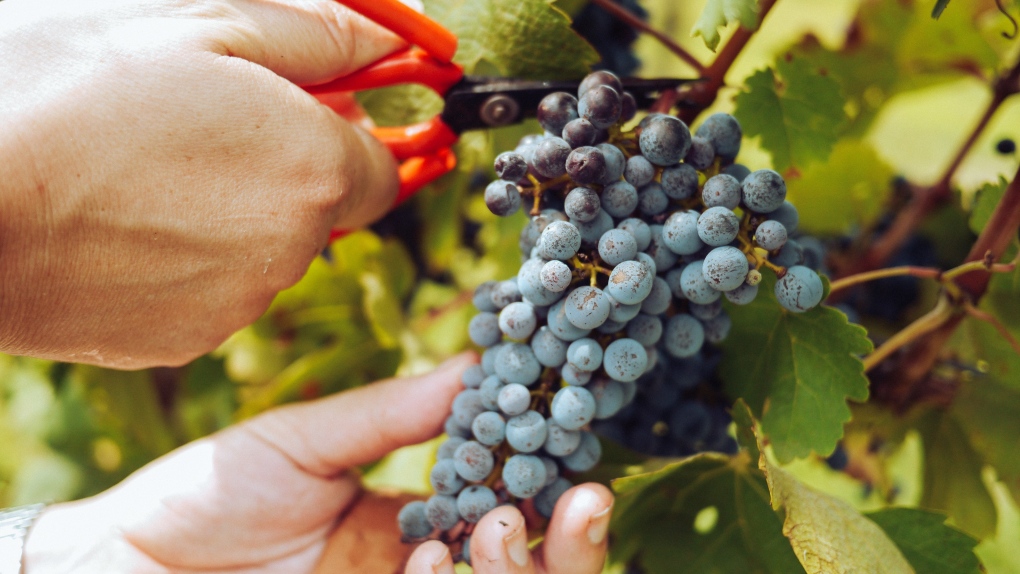
Half of Canadians have negative opinion of latest Liberal budget: poll
A new poll suggests the Liberals have not won over voters with their latest budget, though there is broad support for their plan to build millions of homes.
The grape is beloved around the world as a food and beverage staple that offers a lot of nutritional benefits, and new research suggests there might be another reason to love it: sunburn protection.
A small, peer-reviewed study published Wednesday in the scientific journal Antioxidants found that consuming grapes protected against ultraviolet (UV) skin damage in a group of 29 human volunteers.
Researchers from universities in Massachusetts and New York monitored the volunteers as they consumed whole grape powder – equivalent to 2 ¼ cups of grapes – each day for two weeks. They measured subjects' skin response to UV radiation before and after eating the grapes, and found that, by the end of the study, one-third of the subjects showed increased resistance to sunburn. The authors said that resistance was likely linked to polyphenols, naturally-occurring compounds found in grapes that work as antioxidants in the body.
Analysis of gut microbiome, blood, and urine samples showed the same subjects who demonstrated UV resistance also had unique microbiome and metabolic characteristics that the researchers said suggested a link between people's genes, their gut health and their skin health. In other words, some people's genetic profiles include digestive and metabolic traits that allow them to enjoy resistance to sunburns after eating grapes.
"'Let thy food be thy medicine and medicine be thy food' dates back to the time of Hippocrates," John Pezzuto, the study's lead author and dean at Western New England University, said in a media release. "Now, after 2,500 years, as exemplified by this human study conducted with dietary grapes, we are still learning the reality of this statement."
The report adds to a growing body of scientific evidence that eating grapes can help protect skin against UV radiation. It cites American studies from 2008, 2019 and 2020 that found eating grapes helped prevent skin cancer in hairless mice exposed to UV lights.
UV light is the component of sunlight that ages and damages skin and can cause cancers like melanoma. According to the Nov. 30 study, most skin cancer cases are associated with exposure to UV radiation from the sun.
According to the Canadian Skin Cancer Foundation, more than 80,000 cases of skin cancer are diagnosed in Canada each year. More than 5,000 of those cases are melanoma, the deadliest form of skin cancer.

A new poll suggests the Liberals have not won over voters with their latest budget, though there is broad support for their plan to build millions of homes.
When identical twin sisters Kim and Michelle Krezonoski were invited to compete against some of the world’s most elite female runners at last week’s Boston Marathon, they were in disbelief.
Appointing a trusted person to help with financial obligations can give you peace of mind. In his personal finance column for CTVNews.ca, Christopher Liew outlines the key benefits of naming a confidant to take over your financial responsibilities, if the need ever arises.
The federal government has added $36.4 million to a program designed to support people who have been seriously injured or killed by vaccines since the end of 2020.
Senators in Canada claimed $7.2 million in expenses in 2023, a nearly 30 per cent increase over the previous year.
A Winnipeg man said a single date gone wrong led to years of criminal harassment, false arrests, stress and depression.
A photographer who worked for Megan Thee Stallion said in a lawsuit filed Tuesday that he was forced to watch her have sex, was unfairly fired soon after and was abused as her employee.
A Minnesota state senator and former broadcast meteorologist told police that she broke into her stepmother's home because her stepmother refused to give her items of sentimental value from her late father, including his ashes, according to burglary charges filed Tuesday.
Australian police arrested seven teenagers accused of following a violent extremist ideology in raids across Sydney on Wednesday, as a judge extended a ban on social media platform X sharing video of a knife attack on a bishop that started the criminal investigation.

The giant stone statues guarding the Lions Gate Bridge have been dressed in custom Vancouver Canucks jerseys as the NHL playoffs get underway.
A local Oilers fan is hoping to see his team cut through the postseason, so he can cut his hair.
A family from Laval, Que. is looking for answers... and their father's body. He died on vacation in Cuba and authorities sent someone else's body back to Canada.
A former educational assistant is calling attention to the rising violence in Alberta's classrooms.
The federal government says its plan to increase taxes on capital gains is aimed at wealthy Canadians to achieve “tax fairness.”
At 6'8" and 350 pounds, there is nothing typical about UBC offensive lineman Giovanni Manu, who was born in Tonga and went to high school in Pitt Meadows.
Kevin the cat has been reunited with his family after enduring a harrowing three-day ordeal while lost at Toronto Pearson International Airport earlier this week.
Molly Knight, a Grade 4 student in Nova Scotia, noticed her school library did not have many books on female athletes, so she started her own book drive in hopes of changing that.
Almost 7,000 bars of pure gold were stolen from Pearson International Airport exactly one year ago during an elaborate heist, but so far only a tiny fraction of that stolen loot has been found.
 (Pexels / Grape Things)
(Pexels / Grape Things)